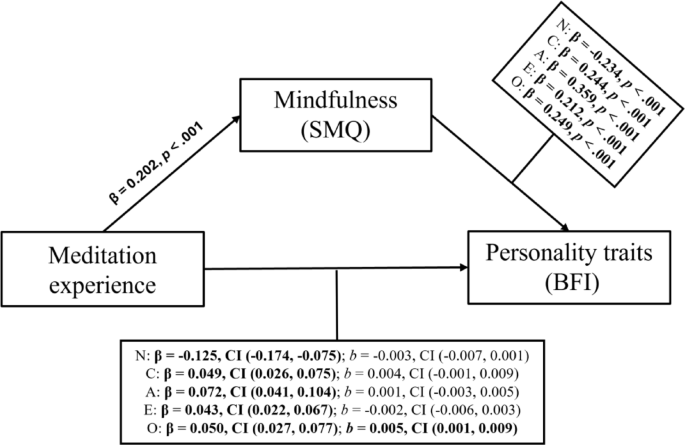The key role of cognitive fusion linking mindfulness and personality: a cross-sectional study

The present study investigated two research questions. Firstly, we tested whether mindfulness mediates the relationship between meditation experience and personality. This analysis aimed to explore whether mindfulness meditation may potentially shape personality traits according to the Big Five model, as suggested in previous research16,24,25.
Our findings show that mindfulness significantly mediates the relationship between meditation experience and personality across all five personality traits. More specifically, individuals with greater meditation experience report significantly higher levels of mindfulness, which in turn is associated with lower neuroticism and higher levels of conscientiousness, agreeableness, extraversion, and openness. These results align with existing literature and our predictions10,12,26, and provides support for the hypothesis that mindfulness meditation contributes to personality change. The strongest standardized indirect effect was observed for neuroticism, a trait linked to affective lability, anxiety and vulnerability to stress13. Neuroticism is a well-established risk factor for suffering from anxiety and depressive disorders, as well as general psychological distress13. Even modest reductions at the trait level may lead to clinically relevant protective effects18,43,44. On an individual level, consistent meditative practice over time may yield cumulative, incremental changes in aspects of neuroticism such as emotional instability, leading to increased resilience and substantial improvements in psychological well-being45,46. MM may therefore be especially well-suited to individuals with high levels of neuroticism, offering a promising opportunity for the development of more individualized mindfulness-based treatments. Prior research has suggested that personality traits, such as neuroticism, may influence how individuals respond to and benefit from mindfulness-based interventions14, and evidence from student samples shows that those high in neuroticism experience greater benefits15. Tailoring such treatments to specific personality traits could enhance their effectiveness by targeting those who are most likely to benefit.
Beyond neuroticism, mindfulness also displayed positive associations with conscientiousness and agreeableness, traits characterized by discipline, reliability, empathy and prosocial behavior13. Notably, research has shown that conscientiousness and agreeableness increase with age, while neuroticism tends to decrease from adolescence to adulthood33. These findings align with the association between mindfulness and personality10,12. Interestingly, this parallel suggests that meditative practice may promote a personality pattern similar to that of individuals with greater life experience. This interpretation is further supported by our own findings, where age emerged as a significant covariate across all our mediation models. Including age as a covariate in future studies on this topic is integral to untangle age-related personality trait changes from the effects of mindfulness practice itself. In contrast, meditation intensity, measured in weekly hours of meditative practice, did not function as a significant covariate in any of our models. This suggests that cumulative meditation experience may be more relevant than current practice frequency, when assessing the impact of mindfulness on personality traits.
It is important to acknowledge that personality traits are relatively stable constructs, influenced by genetic, developmental and environmental factors47. As such, it is unsurprising that the effect sizes observed in our study were relatively small for a single factor such as meditative practice. Nonetheless, multiple studies have demonstrated that a modifiable construct like mindfulness displays significant associations with personality traits16,24,25, suggesting that mindfulness meditation could promote lasting improvements in mental wellbeing. When considered across a large population, even modest reductions in neuroticism could result in fewer individuals crossing the threshold into clinical anxiety or depression. Still, to draw more definite conclusions, the base of evidence must be strengthened through large, longitudinal studies. Our cross-sectional findings should be regarded as valuable, but preliminary groundwork, enabling more rigorously designed research. At the same time, advancing this area of research requires clarifying the psychological mechanisms through which mindfulness exerts its influence on personality.
In this context, our second hypothesis aimed to improve our understanding of how mindfulness affects personality, by exploring the mediating role of cognitive fusion. Our results show that cognitive fusion is a significant mediator for each of the three relevant personality traits, confirming our second hypothesis on a diverse sample of meditators. The mediation between mindfulness and neuroticism is distinguished by its notably larger total effect compared to other personality traits. 63% of this total effect is mediated through cognitive fusion, highlighting its central role in this relationship. This suggests that reductions in cognitive fusion account for a substantial proportion of the overall influence mindfulness exerts on this trait. These results indicate that the observed association between mindfulness and neuroticism might be primarily linked through changes in cognitive flexibility. This may correspond to decreases in the experience of emotional distress and negative affect since both constructs are closely associated with neuroticism48.
Our results therefore align with previous research highlighting the association between cognitive fusion, within the framework of psychological flexibility, and reduced negative and depressive symptoms in individuals with schizophrenia spectrum disorders (SSD)49. Further underscoring the relevant role of cognitive fusion in mental health outcomes, recent studies identified cognitive fusion as a mediator in the relationship between mindfulness and reductions in symptom severity among individuals with SSD50 and in the association between mindfulness and decreased negative affect29. This pattern is also reflected in the practice of Acceptance and Commitment Therapy (ACT)51. As pointed out by Gillanders et al.27, ACT targets present-moment awareness as a preliminary step to initiate cognitive defusion, aiming to increase psychological well-being in the short term. By showing that mindfulness also influences the more enduring concept of personality, specifically neuroticism, through increases in cognitive flexibility, our results suggest that the impact of mindfulness may extend beyond reductions in negative affect and symptom severity, potentially leading to more long-term improvements in psychological well-being. These findings highlight the therapeutic potential of mindfulness-based interventions, particularly those targeting cognitive fusion, such as ACT and other third-wave CBT approaches, to promote lasting mental health improvements. The implications may extend beyond clinical settings, supporting the value of meditative practice in promoting psychological resilience.
Apart from its influence on neuroticism, the indirect effect was also significant for agreeableness and conscientiousness. Compared to neuroticism, the magnitude of the standardized indirect effect was more moderate. Nonetheless, cognitive fusion also accounted for a large part of the effect of mindfulness on these traits, with 68% for conscientiousness and 47% for agreeableness being mediated through the indirect pathway. Interestingly, the results for extraversion were significant and comparable in magnitude to conscientiousness and agreeableness. To our surprise, cognitive fusion fully mediated the association between mindfulness and extraversion, as the direct effect became non-significant once the mediator was added, accounting for approximately 90% of the total effect. The non-significant direct effect aligns with extensive evidence10,12, outlining that extraversion is typically weakly associated with mindfulness. This full mediation is an important new finding since it reveals a previously unrecognized indirect pathway through which mindfulness does, in fact, seem to influence extraversion. Similarly, with the addition of covariates, cognitive fusion fully mediated the relationship between mindfulness and conscientiousness. This underscores the importance of accounting for changes in psychological flexibility, when examining how mindfulness affects personality traits. As expected, the results concerning openness to experience were insignificant.
Notably, as in the first hypothesis, age was a significant covariate across all models. Beyond its discussed association with mindfulness and personality, age was found to significantly influence levels of cognitive fusion as well52, making its continued significance as a covariate unsurprising. Meditation intensity did not display statistical significance.
Cognitive flexibility seems to be a key mechanism through which mindfulness affects several aspects of personality. It appears to have an especially strong influence on neuroticism, suggesting that changes in cognitive fusion may significantly contribute to the association between mindfulness and mental well-being.
Strengths and limitations
A notable strength of this study is its large sample size of 779 participants, which enhances the statistical power and reliability of our results. Additionally, collecting data on a diverse sample of regular meditators with varied backgrounds provides a comprehensive context for examining mindfulness, cognitive fusion and personality traits.
We also acknowledge that this study has several limitations. The most important one is its cross-sectional design, which prevents conclusions about causality. Therefore, our mediation models serve as atemporal models of mediation53. The direction of relationships between mindfulness, cognitive fusion and personality, as well as meditation experience, mindfulness and personality cannot be established, and further longitudinal trials are needed to confirm the causal pathways behind our suggested model.
An additional contextual limitation concerns the timing of data collection (June 2020 to August 2021), which coincided with heightened COVID-19 infection rates and widespread public health restrictions. Pandemic-related conditions, such as elevated distress levels, limited mobility and lifestyle restrictions may have influenced responses, particularly levels of cognitive fusion. This context should be considered when interpreting the results.
The data primarily comes from meditators in Western countries, limiting the generalizability of these findings. Although the survey was available in English and distributed to meditation centers worldwide, recruitment was limited by access to those centers and their internet presence. Although such limitations are inherent to international online surveys, they limit the generalizability of our results.
Future directions
The results for both of our hypotheses offer a promising foundation for future explorations. Specifically, both research questions could be combined into one longitudinal study over an extended period of time, researching the change of personality traits in response to mindfulness meditation, and exploring whether changes in cognitive fusion mediate this influence. Replication using longitudinal designs are integral to confirm and extend the current results, address the limitations of our cross-sectional design, and clarify the causal direction of the relationship between the variables.
Additionally, the current findings highlight a promising direction for developing more individualized mindfulness-based interventions by tailoring them to personality traits such as neuroticism, thereby enhancing their effectiveness by targeting those likely to benefit the most.
Conclusion
This article explored the relationship between mindfulness and personality, focusing on two research questions. First, we investigated whether mindfulness mediates the association between meditation experience and personality traits. Our findings demonstrate that mindfulness significantly mediates this relationship across all five traits of the Big Five model, supporting existing literature. Most notably, the strongest mediated effect was observed for neuroticism, a trait linked to emotional instability and psychological distress. This suggests that mindfulness meditation may contribute to changes in personality, particularly by reducing neuroticism, promoting lasting improvements in mental wellbeing.
Second, to elucidate how mindfulness influences personality traits, our findings highlight the central role of cognitive fusion as a mediator. Our analysis suggests that changes in cognitive flexibility account for a substantial proportion of the association between mindfulness and neuroticism and, to a lesser extent, for conscientiousness and agreeableness. Additionally, we identified a previously unrecognized indirect pathway, as cognitive fusion fully mediates the effect of mindfulness on extraversion, a personality trait consistently found to be minimally associated with mindfulness. Together, these results suggest that mindfulness meditation may have a transformative influence on personality structure, with increased cognitive flexibility emerging as a key psychological mechanism underlying these changes.
link






